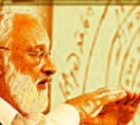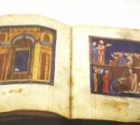-1366871064.jpg)
Illustrations by Danielle Meler
The Talmud in Masekhet Yevamot (62) tells of the plague that killed Rabbi Akiva's thousands of students during the period between Pesach and Shavuot, as punishment for their disrespectful treatment of one another. It is generally believed that the quasi-mourning traditionally observed during the sefira period is in commemoration of this terrible tragedy.
Rabbi David Silverberg (http://tinyurl.com/4cryy3) notes the painful irony in the fact that specifically Rabbi Akiva's academy was plagued by internal strife and discord. It was Rabbi Akiva himself (cited in the Safra) who famously pointed to the verse in Parashat Kedoshim (19:18), "Ve-ahavta le-rei'akha kamokha" ("You shall love your fellow as yourself") as the "great principle of the Torah." He, perhaps more than his contemporaries, championed the unparalleled central importance of brotherly love and mutual concern. It might seem, at first glance, that the disunity that ravaged his academy marked a tragic educational failure on his part, and reveals his inability to convey this important message to his disciples. Alternatively, however, it is possible to distinguish between the value of "love your fellow as yourself" as emphasized by Rabbi Akiva, and the Talmud's description of his students not showing respect to one another.
Rav Eliyahu Baruch Shulman (http://tinyurl.com/a2m37zt) suggested such a distinction by noting the difference between the terms ahava (love) and kavod (respect). The basis for distinguishing between these terms is a famous remark earlier in Masekhet Yevamot (62) that a husband must "love his wife like himself, and respect her more than himself". This remark clearly presumes a distinction between the feelings of "love" and "respect," demanding that a husband "respect" his wife even more than he "loves" her. Where lies the difference between these two concepts?
Rav Shulman suggests that ahava refers to a sense of kinship one feels with another person, whereas kavod denotes an admiration one feels for another person's distinctive characteristics. Relatives naturally "love" one another because of the bond and connectedness they feel toward each other. This is true as well – albeit in much less intense fashion – of people connected in other ways, such as classmates, teammates and co-workers. People bound together by some shared feature – be it a familial relationship, or common interests, goals or experiences – naturally feel some degree of affection toward one another.
Kavod, by contrast, is, in Rav Shulman's words, "the acknowledgment and deference that we offer to individuality, to individual uniqueness and accomplishment." Respect is directed toward a person's individual features and qualities, those which he does not share with anybody else. As Rav Shulman explains, "We don't honor someone for being the same as everyone else, but for being – in some way – different, and different in a way of value."
The Talmud admonishes a husband to "love" his spouse "as himself," to feel the kindred spirit between them and to treat her accordingly. As his closest relative, so to speak, she deserves the same concern as he shows to himself; her needs must be seen as his own. But, in addition, one must "respect" her individuality and admire her for her distinctive qualities, those parts of her being which he does not share with her. The tension between ahava and kavod is between a sense of oneness and an acknowledgment of distinctiveness; sensing the genuine bond between the two parties while at the same time, appreciating one another's distinctive nature. A husband should love his spouse "like himself," but respect her "more than himself," acknowledging and admiring her individual, distinctive achievement and qualities, that part of the spouse which he himself does not possess.
This, then, helps explain the strife that gripped Rabbi Akiva's academy. Even if the students felt ahava, the kindred spirit shared by all Jews and all Torah students, as their revered teacher admonished, they failed in the area of kavod, of respecting the qualities of those who differed from them. They felt emotionally bound to those of the same kind but could not bring themselves to appreciate and admire each other's distinctive qualities. The tragedy of Rabbi Akiva's students thus teaches the importance of treating others with both ahava and kavod, to both love and admire, to feel both bound to our fellow Jews while at the same time respecting each person's individuality and unique qualities.
Rabbi Dr. Aryeh A. Frimer is the Ethel and David Resnick Professor of Active Oxygen Chemistry at Bar Ilan University.
 ESRAmagazine Photo Contest: terms and conditions
ESRAmagazine Photo Contest: terms and conditions Advertisers List
Advertisers List-1366906022.jpg) Mayor at tree planting
Mayor at tree planting Kabbalah For All
Kabbalah For All Haggadot
Haggadot Passover 5767 ...The Holiday of Freedom
Passover 5767 ...The Holiday of Freedom Aryeh A. Frimer
Aryeh A. Frimer